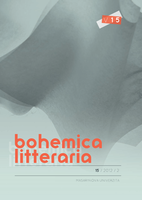„Nicht Jonny, Walzer spielt auf“ Komparativní úvaha nad žánrovými specifiky valčíku v opeře, beletrii a dramatice českého a rakouského fin de siècle
A Comparative View of the Genre Specificity of Walz in Opera, Belles-lettres, and Drama of Czech and Austrian fin de siecle
Author(s): Kristýna CelhofferováSubject(s): Theatre, Dance, Performing Arts, Aesthetics, Comparative Study of Literature, Austrian Literature, Czech Literature
Published by: Masarykova univerzita nakladatelství
Keywords: Waltz; aesthetism; Spieloper; Young Vienna;
Summary/Abstract: The paper focuses on the distinctive features of “waltz” in opera, belles-lettres, and drama of Czech and Austrian fin de siecle. The starting point of the paper is a reflection of waltz reflection in Hofmannsthal’s and Strauss’ opera “Rosenkavalier” and its concept of a Spieloper as a critique of contemporary aesthetism and a reception of this “waltz opera” in the Czech cultural kontext: Zdeněk Nejedlý and Max Brod tried to rethink this opera with regard to the ambivalent innovation of music-expressing facilities and waltz-anachronism. The study in its next step monitors Max Brod’s critical attitudes in the context of his own work. Futhermore, the study compares the use of the waltz in the works of the Austrian context of Arthur Schnitzler, Stefan Zweig and Joseph Roth with works of Jiří Karásek of Lvovice, Julius Zeyer, Jaroslav Kvapil, Josef and Karel Čapeks of the Czech context. In its final part the paper deals with an evocation of jazz adaptations of waltz in late prosaic and essayistic works of Stefan Zweig; finally these works are compared to Ernst Křenek’s opera “Jonny spielt auf” which connects jazz with an escape from the conventional European culture.
Journal: Bohemica litteraria
- Issue Year: 15/2012
- Issue No: 2
- Page Range: 43-68
- Page Count: 26
- Language: Czech

